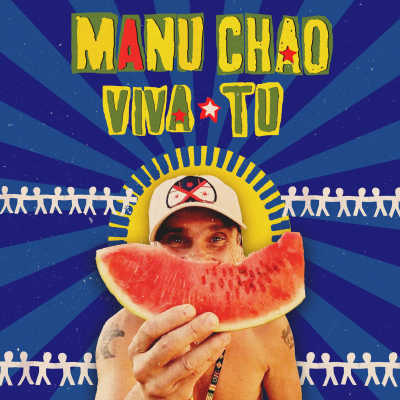|
The news seems to have taken the world by storm. Manu Chao is making his return! Manu Chao’s back! But it’s all fake news. The truth is he never left.
He’s been flying under the radar. On the road to simplicity. Traveling with two friends, “just three guys and three sticks”. The simple bare necessities, as a cheerful bear sang in the Jungle Book. A healthier way of looking at the world. Pared down and uncluttered. Whether by objects or feelings. With a pure heart. And no pretension. Manu Chao is taking up the torch of a folk singer without a stage, playing alongside the people who have come to see him. From ancient storytellers all the way up to Woody Guthrie, the tradition is as old as humanity itself. Something to share and pass on. Just for the sake of it, come hell or high water.
By way of introduction, a song. A rumba. He wrote it for his neighbors. From Barcelona and other places. Like a message in a bottle. “Viva Tu”. Long may you live in Spanish. A suspended moment in time. A selfless invitation, made using words borrowed from an instinctive imagination rather than any set work process. As he has often confessed, “chance is the greatest artist of all time”. Manu Chao is a collector of what he calls “little bits” that come to him. Eventually, these bits and pieces form a song. And that's all it takes. With him, accidents can turn into creations. Rather than perfection or a zero-error illusion, he pursues a form of unfettered, liberated beauty. With words that gaze straight into the eyes of others, he lets them into his heart. In the accompanying video, people are sketched out in a thousand colors, at once nameless and at the very heart of everything. They represent life in all its simplicity, without pretension, when we are able to break away from the time constraints of this greedy, over-hurried world. It is an ode to slowing down everyday life, and bringing bodies and souls closer together. It’s a song he's been playing for quite some time now, in every place the roads have taken him. And there’s no expiration date: as is often the case, Manu Chao will play it over and over again, and it will continue to evolve as he does, at his own pace. For him, songs are alive, in constant mutation. Yet “Viva Tu” is by no means an orphan. It is the promise of an album.
His songs will be the perfect ambassadors. Their lyrics will speak louder than any interview. His silence will allow the media to write their own version of an odyssey. A form of prose freed from the shackles of promotion and constricting questions. About a troubadour, a minstrel. A wanderer. A free man moving from village to village, making the most of stopovers, theaters or inns. Of life. Manu Chao is the world's most anonymous star. With no mask, no disguise, he crosses continents at a poet's pace. Even those unfamiliar with Manu Chao end up knowing him because they have ears, a heart and they’ve been invited to a festival, a wedding, a funeral, you name it. He's a man who's more in tune with solstices than calendar years. He has a truant’s ambition. He’s a singer and a song-gatherer. Whether in a supermarket on the outskirts of Paris, France, or in a faraway village in Uruguay, Manu Chao is always right there. Like a free agent football player who’ll always favor playing pick-up in the back of an alley over winning a trophy.
“Viva Tu” can mean long may you live, and is a celebration of each other. It's a message of hope when the whole world is faltering. It’s an open hand. Hate is within anyone's reach. Love is an act of courage. Manu Chao knows where he stands.
“Viva Tu is first and foremost the love of all my neighbors, it's a rumba I wrote for my neighbors as well as others from various places. It's about accepting yourself as you are, and from the moment you accept who you are, Viva Tu!”
|

